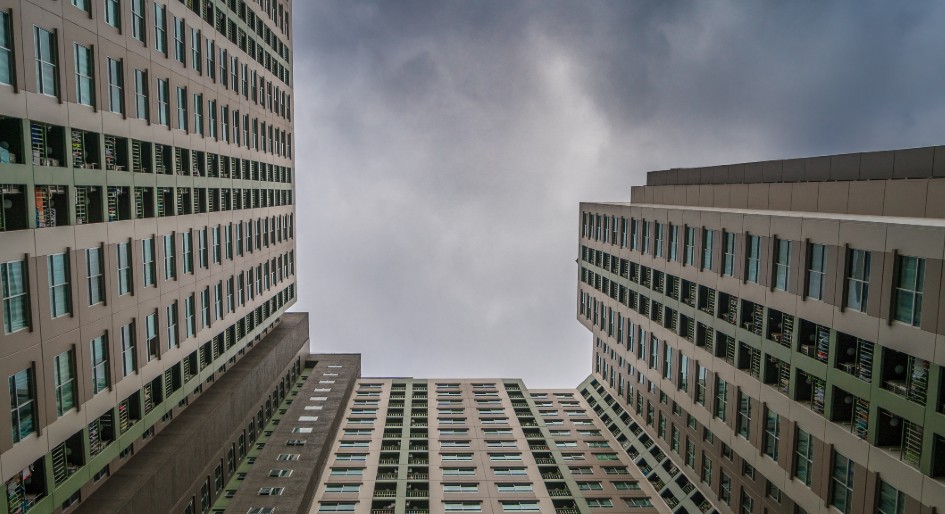A flood in Fort McMurray this past spring costing $100 million in damages. A June hailstorm in Calgary, now ranking as the fourth largest claim in Canadian history at $1.2 billion. These are just two examples of recent catastrophic losses impacting insurance across the country and contributing to a hard market, where premiums are increasing and capacity for many types of insurance are decreasing.
As impacts trickle into condominium corporations, a recent seminar called “The Condo Insurance Crisis: Where do we go from here?” addressed concerns and solutions from industry members across the country. The panel talk took place at CAI Canada’s V-CON (DO) virtual condo conference that brought together board directors, property managers and various professionals across Canada.
One concern is reduced capacity. “This means while some insurance companies are still willing to insure condominiums, they’re reducing how much they write of it,” said Tom Gallinger, vice-president of Atrens-Counsel Insurance Brokers. “They feel it’s a risky area to insure at the pricing levels they’re at. . . they want to reduce their exposure to those big losses that could occur.”
Companies are also being more selective, insuring specific condos and shying away from others that have claims or other “undesirable factors,” such as the age of the building, wiring, piping, plumbing or even geographical conditions.
“Some companies have chosen to exit the marketplace all together,” noted Gallinger. No matter what prices they charge, they assume certain conditions will impede their ability to make money.” Those left in the marketplace are raising their premiums and deductibles quite significantly in certain cases.
Boards and managers are also facing budgeting issues, unable to anticipate what premiums and deductibles will be the following year. Finding the right coverage is also harrowing for many corporations and unit owners. There is less availability of ACT-compliant insurance; legislation in the Condo Act requires a corporation to carry an insurance policy, but it doesn’t tell the insurance companies they must insure the policy.
“We are seeing corporations trying to pass some of the insurance responsibility onto unit owners,” said Gallinger. “And also with higher deductibles—we are seeing corporations with the ability to charge those deductibles back to owners.”
Insurance outlook from Ontario
In Ontario, there are numerous unit owner-driven claims related to items, such as an overflowing bathtub or a neglected toilet seal.
“That’s one of the things that has consistently caused these attritional losses, which have basically caused an impact to the amount of money those insurance companies have in the pot for condominium claims to be paid out,” said Gallinger. “We have also seen some impact from workmanship claims.”
Concerns are mounting for the quality of buildings being constructed in the Greater Toronto Area and possible issues in the early stages of condo development coupled with the aging infrastructure of existing buildings.
Proactive maintenance of the physical structure itself is impacting the market, but it’s an issue that might escape a corporation’s control. Many buildings in downtown Toronto operate above aging water main infrastructure, which was not designed for the modern era.
“We saw a very large water main burst claim cause over $3 million worth of damage to a condo corporation, but also a number of surrounding businesses in Toronto were impacted by that,” Gallinger said. “That is something that is really leading to insurance companies to drive up their pricing—understanding this infrastructure is only going to be getting older.”
For corporations in Ontario who feel far removed from rough weather events in Alberta and B.C., Gallinger suggests they “take heed.” Natural catastrophe claims in Ontario have increased: wind storms in May of 2018 caused “significant damage” for his clients, all the way from Windsor to Ottawa. “We’re seeing this stuff happen more frequently than we have in the past and that’s causing some impact.”
Solutions
What can condominiums do to cope? Gallinger suggests passing a standard unit bylaw and removing some high-exposure areas of the corporation, such as flooring, which is known to greatly contribute to attritional losses. Another opportunity, for now, is passing an insurance deductible bylaw to eliminate that need to prove negligence—potentially saving unrecoverable costs that would have to spring from common expenses.
Getting a regular replacement cost appraisal keeps your value accurate, he said. Without one, insurance companies will inflate the value over time and you’re going to be over-insuring your property and paying too much. Another important aspect is claims management and attending to losses early on.
“Before a claim even happens, have an action plan with individuals on site, whether it be concierge, security staff or building management staff, of how you’re going to handle that situation,” he said. “Most corporations have a fire plan. . . not all corporations have a water damage plan.”
Corporations should also be thinking about claim retention and claim prevention. “The rule of thumb in this marketplace is three times your deductible is probably a good time to consider talking to your broker about whether to put through that property claim.” Preventive maintenance is also key; paying for repairs and renovations now will bring less challenges in the future.
“Unlike a liability incident that may occur at your corporation or a lawsuit, a property damage claim does not have to be submitted to your insurance, he added. “So, you can always talk to your broker about that, provided you speak with an independent broker that represents multiple insurance companies and make sure it is the right decision based on your corporation’s history, the nature of the loss and any other factors.”
Outlook from B.C.
In B.C., strata corporations are required to repair and maintain the common elements by law. But Lawyer Philip Dougan of Citadel Law Corporation knows of many cases where the repair bill has been so high that corporations voted to sell their property for redevelopment, rather than repair the damage.
“If a strata is not taking care of its repair and maintenance obligations very strictly, then that will start pushing over into the insurance world because if you don’t repair the leaky roof, well then, the leaky roof will cause problems within the strata itself,” he said.
In B.C, stratas must also insure original unit fixtures, but depending on particular claims, they aren’t necessarily responsible to replace these items.
The tensions arise in stratas when determining who is responsible for any particular loss, said Dougan. Individual strata owners are not required to have their own insurance, and there have been confrontations over who is responsible for the deductible.
He finds the lack of follow-through for mandatory repairs problematic as people are looking to their insurance as a “fail-safe.” This is driving costs up for insurers who must create higher premiums and deductibles.
Solutions
Stricter enforcement to obtain and fund depreciation reports (reserve fund studies in Ontario) is key. In B.C., these reports are mandatory in the Strata Property Act, but stratas can opt out of them, unlike in Ontario where condo corporations must complete and fund such reports. Having one would “even out the savings process so that the repairs are getting done in a reasonable time and pace,” without a huge expense all at once, proactively reducing the risk for flood or fires.
Another solution is to pass new bylaws forcing owners to become their own risk managers. “We have been advising clients to require their owners to get their own unit insurance,” said Dougan. “We think it’s simply in the best interest of all owners, and a policy at $300 or $400 a year to cover your potential liability on a deductible of $50,000 or $100,000 is a no-brainer.”
Within these bylaws, owners should be required to replace their old appliances on a regular basis, like an older dishwasher which is culpable of leaking. Every building should also include must-haves, like water level switches and water shut-offs. At least in B.C, 70 per cent of claims are flood related.
“The math is very simple, if you stop having claims, eventually the premiums and deductibles will at least stay still, if not potentially go down.”
Strata corporations already have a right to enter and inspect a unit. He suggests expanding that current standard bylaw to allow professionals retained by the corporation, like a plumber, to enter and inspect hoses, appliances, plumbing and fire detection systems for example. Another suggestion is to allow insurers to dictate requirements for the stratas— for instance, ensuring stratas adhere to the depreciation report if they want coverage. “Insurers themselves can also start looking at these ideas for bylaws and enforcement and saying those are the kind of bylaws we want you to have,” he said, stressing the significance of this in B.C.
He recalls a 50-unit building he recently worked with. “Their last year’s insurance premiums were $40,000,” he said. “This year’s was for $102,000—for exactly the same coverage.”
Outlook from Alberta
Weather has been a key impact to the insurance market in Alberta, which remains the top area in Canada with the most claims. As Tony Reed, vice-president, client executive at BFL Canada Insurance Services, put it, “you can experience all four seasons in one day.”
“Hail out in Alberta will come in for about 10 minutes and cause hundreds of millions of dollars in damage to units,” he said, pointing to the recent storm in June.
Solutions
The province recently ushered in changes to its Condo Act in January 2020. Parts of that legislation are expected to deeply impact the current insurance market. For instance, when damage occurs in an owner’s unit, a condominium corporation can now chargeback the deductible up to a maximum of $50,000.
“The majority of claims in Alberta are due to weather changes: when it goes from minus 20 to plus 20, people want to open their windows to cool the apartments down and this causes freezing,” added Reed. “It’s amazing when you put a bit of financial responsibility onto the individual with the $50,000 deductible or $25,000 deductible—now they remember to keep those windows closed.”
New rules also make corporations responsible for overseeing repairs to units where losses have occurred, making sure proper restoration professionals are hired and a certification of insurance is in place so work is being done properly. A new bylaw under the Act also states a corporation may demand that unit owners carry coverage. In addition, one of the largest problems he tends to see are old bylaws, but now new regulations supersede them. Where in the past a corporation could charge back the deductible as long as negligence was proven, now at least, corporations can “recoup some of these deductibles.”
A new bylaw requirement called the standard insurable unit description is a way for boards in Alberta to clearly define what is covered under the corporation’s insurance and what a unit owner is responsible for.
“What this has done is clearly define what an improvement and betterment is, allowing unit owners to make sure they purchase the proper insurance.”
The new Act also allows the board to oversee the hiring of the proper trades so repairs can be done efficiently. When there is a claim, and an insurance company is paying for a new roof or siding for instance, Reed suggests corporations take the opportunity to look for potential upgrades—better shingles or other products that are more resilient to rough weather. Of Ontario, he says, “if there are some water issues or flooding, look into moving HVAC equipment to the roof or installing a sump pump in the elevator shaft.”






The issue for condo insurance companies is “risk”. Ask yourself, why is it that single family home owner insurance isn’t skyrocketing like condo owner insurance? I’ll tell you again…it’s “risk”. A single family home owner is responsible for his/her actions, and their actions alone, other their named “major”perils such as lightening, fire, flooding, etc. These major perils for single family homes are rare, and infrequent. Also, any internal losses are generally handled by the homeowner, without filing a claim, as he/she does not want their premiums to increase due to claims.
The problem with condos is that for some reason, it’s acceptable for the condo corporation to bear not only the responsibility for major perils (which I agree with) but for those damages that happen and are caused within a unit (which I don’t agree with and is the main problem!!!). The reason condo corporations are responsible for in-unit claims is because the respective legislation in all provinces, for some reason, states that the condo policy is “first” so even though the condo owner may have an insurance policy in place for his/her unit, which usually includes liability, the unit owner is not allowed to use his/her policy…the condo corp policy is obligated to respond. Now, there has been legislative changes to require the owner to pay back the corporations deductible where it was determined that the owner was liable…so what?…the corporations loss history just took the hit and that’s what drives rates. An insurer is going to refer to the loss history on renewal, and if there have been a number of claims…without a doubt…the insurance premium will go up. Also, yes…there are other trends that affect rates such as market/global catastrophic losses. The market global piece affects all forms of property insurance coverage so single family home owners are hit the same way as condos but because the “risk” and “insured value” is much less for single family owners they are therefore not affected the same way as condos owners.
Also, a legislative attempt made to fix the “risk” issue was to allow condo corps to amend their Bylaws to include a “Standard Unit” definition. All this does is limit the amount paid for the determined value of loss within the “Standard Unit” definition. Again, the condo corp still takes the hit and the loss history is added to again.
So again, as condo owners are usually required to maintain insurance coverage for their respective units (ie to obtain mortgages), and will include liability…so why is it ok for insurance companies to get away with charging for liability coverage knowing full well that they will not be required to use it? And…they are usually the first ones to remind their condo unit owner customer, when they report a claim for their unit, that the condo corp insurance coverage has to respond?
I brought this scenario forward to a panel of attendees invited to participate at a meeting with the Saskatchewan Government for considering and legislative changes to the Condo Property Act. One of the participants was an exec from SGI (Saskatchewan Government Insurance), and his response was, “well, that would mean that the Insurance Act would have to change”, to which I replied…of course. Why would the insurance companies encourage changes to the Insurance Act when there is no motivation to do so? They are making money on owner premiums by not having to respond to liability claims, and their making money on the outrageous rates they are now charging condo corporations.
I continue to feel like I am “beating a dead horse” here as no one is hearing me. I have been pushing this issue for over 30 years now. Maybe if you published what I have said here condo owners would start asking questions about why does my policy include liability coverage if I will be denied access to it? Maybe condo corporations would also start to understand the “risk” issue.
I agree that the condo corporations policy should extend to protect the corporation from all named major perils under their policy…that’s what it’s for. It shouldn’t be used to fix 6 floors of damage caused by one owners accident by overflowing tub, etc. Or burning/scorching caused to countertops or flooring because of a cigarette dropped.
Not only is insurance an issue for condo living, so is property taxes. It seems if a person chooses to buy a condo vs. a single family property, this person is treated differently. The condo owners property taxes are usually higher, they have lessor services than single family owners, ie garbage removal, road maintenance including snow removal etc.
Oh, and then I hear recently that legislation was changed to allow Reserve Funds to be used when there are unforeseen expenses, such as huge unexpected insurance premiums. How ridiculous is this…of course condo corps, and owners are going to think they have found new money to be able to pay their insurance, without the need of having to levy a special assessment, but they don’t realize they’re shooting themselves in the foot as legislation still requires “Reserve Funds” to be properly and adequately funded. A “special assessment” is going to happen regardless because you have now shorted the Reserve Fund…argh!!!
So, the bottom line is that legislation has to change making the responsibility for owner caused damages, within their unit, along with resulting damages to other units and common property, to be the responsibility of that unit owner. I have talked to many unit owners about this and they a shocked when they find out, from me, that their own insurance for their own unit liability cannot be used. This then suggests that every other owner has to pay for one owners mishap within their unit…what??? No wonder condo Corp rates are the way they are.
I can almost guarantee that insurers would look more favourable to insuring condo corporations if the “risk” I refer to was addressed.
“Retired” (I still care) Condominium Property Manager
from Regina, Saskatchewan
,Randy Heathcote 😁
I am currently trying to put together a standard unit agreement and introduce at the AGM in mid 2022.
Our corporation is facing the same challenges, while we are not a new building (25-26 years old) our systems are reasonably maintained, ( external caulking, new roof, new boilers, new make up air for common areas) we are currently initiating the upgrading (basically replace) the heating and AC coil units in each apartment. (Possibly some risers?)
And yet, the lack of a standard unit is the loose cannon, a big problem for the board, and when (if) we manage to make and pass it, the insurance problem will still de stabilize our financial situation.
What can be done -in your opinion- to effect a change to the Condo Property Act in Ontario?
Anyway, I feel that condominiums are the milking cow of municipalities, not only by higher taxes, but demanding systems (ones passed by their standards) now to be upgraded to the new ones. Keeping the economy mobile, collecting new taxes with hands in the pockets of people who hoped to invest in homes for their older age.